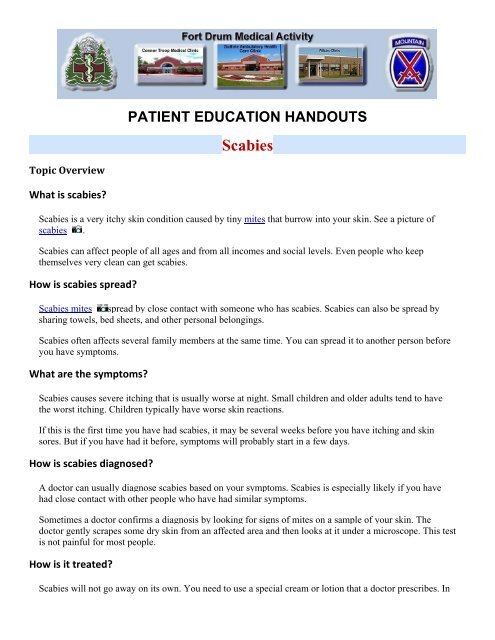Scabies
Scabies Scabies
PATIENT EDUCATION HANDOUTSScabiesTopic OverviewWhat is scabies?Scabies is a very itchy skin condition caused by tiny mites that burrow into your skin. See a picture ofscabies .Scabies can affect people of all ages and from all incomes and social levels. Even people who keepthemselves very clean can get scabies.How is scabies spread?Scabies mites spread by close contact with someone who has scabies. Scabies can also be spread bysharing towels, bed sheets, and other personal belongings.Scabies often affects several family members at the same time. You can spread it to another person beforeyou have symptoms.What are the symptoms?Scabies causes severe itching that is usually worse at night. Small children and older adults tend to havethe worst itching. Children typically have worse skin reactions.If this is the first time you have had scabies, it may be several weeks before you have itching and skinsores. But if you have had it before, symptoms will probably start in a few days.How is scabies diagnosed?A doctor can usually diagnose scabies based on your symptoms. Scabies is especially likely if you havehad close contact with other people who have had similar symptoms.Sometimes a doctor confirms a diagnosis by looking for signs of mites on a sample of your skin. Thedoctor gently scrapes some dry skin from an affected area and then looks at it under a microscope. This testis not painful for most people.How is it treated?Scabies will not go away on its own. You need to use a special cream or lotion that a doctor prescribes. In
PATIENT EDUCATION HANDOUTS<strong>Scabies</strong>Topic OverviewWhat is scabies?<strong>Scabies</strong> is a very itchy skin condition caused by tiny mites that burrow into your skin. See a picture ofscabies .<strong>Scabies</strong> can affect people of all ages and from all incomes and social levels. Even people who keepthemselves very clean can get scabies.How is scabies spread?<strong>Scabies</strong> mites spread by close contact with someone who has scabies. <strong>Scabies</strong> can also be spread bysharing towels, bed sheets, and other personal belongings.<strong>Scabies</strong> often affects several family members at the same time. You can spread it to another person beforeyou have symptoms.What are the symptoms?<strong>Scabies</strong> causes severe itching that is usually worse at night. Small children and older adults tend to havethe worst itching. Children typically have worse skin reactions.If this is the first time you have had scabies, it may be several weeks before you have itching and skinsores. But if you have had it before, symptoms will probably start in a few days.How is scabies diagnosed?A doctor can usually diagnose scabies based on your symptoms. <strong>Scabies</strong> is especially likely if you havehad close contact with other people who have had similar symptoms.Sometimes a doctor confirms a diagnosis by looking for signs of mites on a sample of your skin. Thedoctor gently scrapes some dry skin from an affected area and then looks at it under a microscope. This testis not painful for most people.How is it treated?<strong>Scabies</strong> will not go away on its own. You need to use a special cream or lotion that a doctor prescribes. In
severe cases, your doctor may also give you pills to take.Some scabies medicines are not safe for children, older adults, and women who are pregnant or breastfeeding.To avoid dangerous side effects, be sure to follow your doctor’s instructions carefully.If you have scabies, you and anyone you have close contact with must all be treated at once. This keeps themites from being passed back and forth from person to person. You must also carefully wash all clothes,towels, and bedding.After treatment, the itching usually lasts another 2 to 4 weeks. It will take your body that long to get overthe allergic reaction caused by the mites. If you still have symptoms after 4 weeks, you may need anothertreatment.Frequently Asked QuestionsLearning about scabies:Being diagnosed:Getting treatment:Ongoing concerns:• What is scabies?• What causes it?• Can I prevent it?• What are the symptoms?• How does scabies progress?• What increases my risk for scabies?• Who can diagnose scabies?• How is it diagnosed?• How is scabies treated?• What medicines will I need to take?• What can I do to treat it at home?• How can I rid my home of scabies mites?• How long after scabies treatment can my child return to school?Author: Shannon Erstad, MBA/MPH Last Updated: April 4, 2007Medical Review: Adam Husney, MD ‐ Family MedicineKathleen Romito, MD ‐ Family Medicine_________________________________________________________________________________________________Reviewed 9 June 2008



